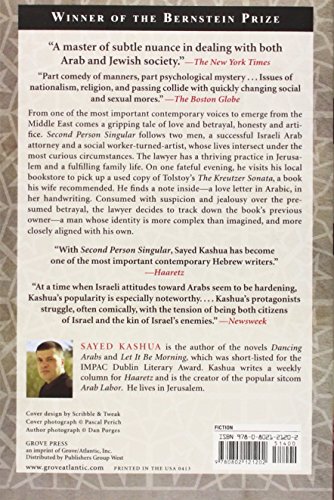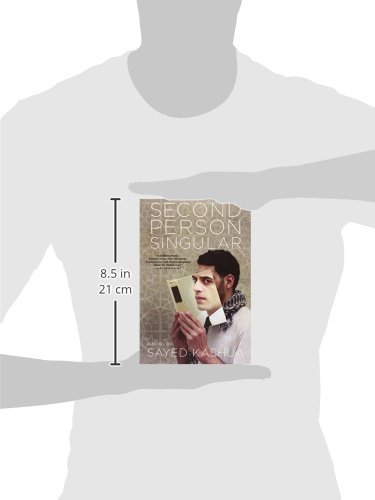Customer Services
Copyright © 2025 Desertcart Holdings Limited




Second Person Singular
R**N
Yonatan
A 28-year old parapalegic, Yonatan, is a pivotal figure in Sayed Kashua's novel, "Second Person Singular". The book examines the relationship between Arabs and Jews in Israel as well as relationships between Arabs themselves. The book also raises broader questions about the nature of personal identity: what it is and the extent to which emphasizing it may be valuable or harmful to a person or a society. Sayed Kashua is a Palestinian who lives in Israel and who has a following among both Israeli Jews and Arabs. Originally published in Hebrew in 2010, the book was translated into English in 2012 by Mitch Greenberg, the military correspondent for the "Times of Israel". The book reads lucidly and quickly in translation.The book tells the parallel stories of two Palestinian men who live and work in Jerusalem. The first is the story of a man identified only as "the lawyer". The lawyer is a successful criminal attorney who defends Palestinians in Israeli courts. He is married to a woman named Leila, a social worker who holds advanced degrees, and the couple has two young children. Leila came from a different class of Arab society than did the lawyer, a fact emphasized during Kashua's depiction of their courtship. The marriage appears somewhat tepid as the lawyer and Leila for the most part sleep separately. The lawyer's story is recounted in the novel in the third person.The other protagonist is a young man, 28, who tells is story in his own words. Rather late in the book, his name is given as Amir. But as the book develops, Amir develops not one identity but several. Amir is trained as a social worker but develops an interest in photography for which he shows marked ability. He comes from a small settlement town in which his mother is an outcast. His father had apparently been killed for collaborating with the Israelis.The two stories are gerrymandered together through the figure of Yonatan. Amir gets a part-time job caring for Yonatan. And one night, the lawyer, ever seeking to improve himself, buys a used copy of Tolstoy's short novel, "The Kreutzer Sonata". A note falls out written in Arabic in his wife's handwriting that appears to be a love note to another man. Yonatan's name is written in the cover of the book. In spite of his training as a criminal lawyer which encourages skepticism and a careful weighing of evidence, the lawyer is beside himself, thinking that his wife is involved with another man and with a Jewish man at that.There is a great deal in this book about differing groups of Arab people in Israel and their tenuous, difficult relationship to the country. The best scenes of the book describe the backgrounds of the lawyer and of Amir and their varied attempts to make something of themselves. The story of the lawyer, his insane jealousy, and of how Amir dovetails into the situation is too complex and contrived to be convincing. The story descends into something of a parable.The characters and the author face questions about personal identity that are most provocatively addressed by two secondary figures, a young Palestinian lawyer Tarik who works with the lawyer and Ruchaleh, the mother of Yonatan. For example, in a scene early in the book, Tarik is invited to a gathering of educated Palestinians who are discussing what they see as a separate Palestinian "narrative" in Israeli schools. Tarik boldly questions his peers on why a "narrative", Zionist or Palestinian, is important at all. The lawyer fleshes out the thought with the elliptical observation: "sometimes I think a tree is a tree and a man is a man."Although it is marred by heavy-handed plotting and by the use of coincidence, this book offers insight into Israeli Palestinians and into Jewish-Palestinian relationships in Israel. The book also invites the reader to think about the possible limitations in holding to a strong sense of personal identity. The suggestion is that people are not like trees who need their "roots" to survive and grow. Individual identities may change and may be more like one another than sometimes is supposed.Robin Friedman
M**K
second Person Singular is also a novel that examines love, betrayal
A fascinating novel of identity, second Person Singular is also a novel that examines love, betrayal, trust, materialism, and what values make life worthwhile--one's job, one's family (ESP one's children), one's possessions, one's intellect. I was struck by the parallels to Tolstoi's Kreutzer Sonata so much so that I was anxious that the wife of SPS might have the same fate, a tension that made reading "the lawyer's" sections very real. But I also heard echoes of another Tolstoy novella, The Death of Ivan Ilyich, in which a successful man comes to realize what he actually values and what he does not, namely the materialism and need for society's approval. The complexities of being an Israeli Arab were fascinating, especially the role of the "stranger" (hints of Camus), an Arab collaborator with the Israelis or a relative of such a one. Also, as someone else wrote, I wonder about the mysterious role the paraplegic Yonatan plays in the novel. Is his attempted suicide and paralyzed state meant to suggest something about Jewish identity--if so, what? His mother is one of the most compassionate, empathetic characters in the novel so that it seems strange that his "accident" is felt to be a punishment of her. And finally, most interesting are all the stereotypes each member of society has about other groups. When one's identity is fluid, one both experiences and hears all, but such stereotyping, though human, can lead to murder, mayhem, distrust, even war. A powerful book that is hard to put down.
M**S
I thought this was a very good novel about arabs living in Israel and how they ...
I thought this was a very good novel about arabs living in Israel and how they manage to be partly assimilated into the Israeli culture. OUr two protagonists, one a very established lawyer who defends Arabs who get in trouble in Jerusalem, the other, a young man from the territories who is a social worker trying to get along on a tight budget and is offered a job caring for a quadruplagegic . Their paths cross when a letter written by the lawyer*s wife is found by the lawyer in a copy of the Kreutzer sonata. The book is signed Jonatan, an Israeli name that the lawyer can not connect to but the handwriting belongs to his wife. He is determined to find out if his wife has taken a lover and is convinced he must find out who is this Jonatan. I loved Kashua*s writing and found the plot with its marvelous descriptions of trying to appear successful as an Arab in Israeli Jerusalem just wonderful. The plot gets a bit complicated, but along the way, I learnt a lot about how Arabs are treated in this part of Israel.
O**E
Worth the effort
I read this book because I was curious to learn how Israeli Arabs feel about living in a Jewish state. After finishing it, I have decided to try other books written by Kashua even though I often felt that the descriptions of the Lawyer protagonist's jealousy went on too long. However, I also remained interested enough to read on because I felt that I was learning something about the psychology of an Israeli Arab citizen. What I learned from the two main protagonists is depressing if it is true of a significant number of Arab Israelis - and that is that they lead lives of constant self-doubt and self deception in attempting to reconcile their two identities. I won't know if this is really true until I have read more.I gave the book four stars even though I was tempted to give it only three because I did think that it was well-written if often exacerbating.
M**R
Four Stars
Imaginative writing. Very poignant story.
A**L
An Israeli Arab or an Israeli with an Arabic background?
That an Arab Israeli has Jewish insights and aspirations is captured extremely well, reportedly this is donegat autobiographical. We shouldn't be surprised at the cultural confusion, internal conflict, divergent views that our protagonist experiences, as do marginal people, per 1960s sociology, who live in two worlds, and teeter in the border.
C**Y
Really liked the book but
The lawyer is way over the top. Hard to imagine someone so successful can be so crazy? Yes the book is about acceptance and the AMir character well written.
L**R
Great book
Best ever written book on identity
M**G
Identity
Very well written. The primary character could have also been a black person trying to identify in the same way.
Trustpilot
1 month ago
1 month ago